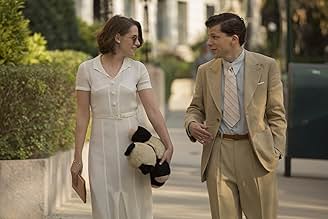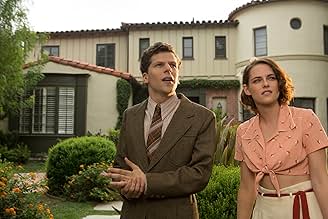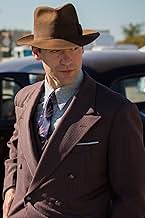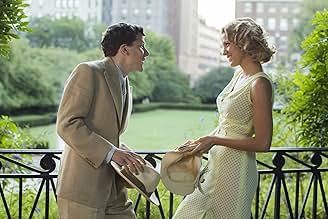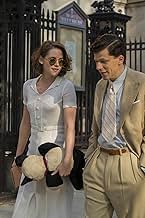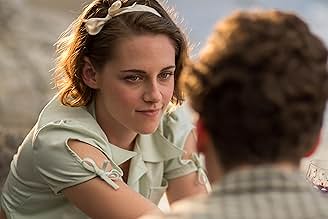AVALIAÇÃO DA IMDb
6,6/10
83 mil
SUA AVALIAÇÃO
Na década de 1930, um nativo do Bronx se muda para Hollywood e se apaixona por uma jovem que está saindo com um homem casado.Na década de 1930, um nativo do Bronx se muda para Hollywood e se apaixona por uma jovem que está saindo com um homem casado.Na década de 1930, um nativo do Bronx se muda para Hollywood e se apaixona por uma jovem que está saindo com um homem casado.
- Prêmios
- 8 indicações no total
Avaliações em destaque
Really nice pic of the thirties.
Beautiful paintings but... something is missing the creepy family deserved more...
They were funny but not important enough it seems
There is a lot going against this movie. Jesse Eisenberg's character comes off as a complete asshole within 10 minutes of the film, thanks to a really terrible scene between him and a Jewish hooker. None of the humor in that scene landed, which just made the situation really sad and uncomfortable to watch, and then kind of difficult to root for Eisenberg at all after that. Steve Carell isn't bad by any means, but he seems incredibly miscast in a role like this (not to say that he can't act in roles that are more serious, but this Hollywood film executive didn't really suit him). Both of the Dorfman parents come off as really awkward on screen and thus kill any of the jokes that they're meant to deliver. The only actor that gives a notable performance in this movie is Corey Stoll as the brother, but it's not enough. Kristin Stewart was mostly fine, but occasionally started picking up some of her infamous Kristin Stewartisms throughout. Carell and Eisenberg become really close out of nowhere, both of the couples' relationships are sped up by Woody Allen's narration (which doesn't really add anything to this film), and this movie is only 90 minutes long, so I feel as if they could have definitely spent more time with all of these relationships, instead of just having Woody tell us what was happening. And on top of all of this, while this is a beautiful film to look at, there is nothing new in this movie. It's another Woody Allen movie with the same romances and love triangles centered around white people who like jazz with a pretty inconclusive and unsatisfying ending.
In my humble opinion most Woody Allen movies have a feel but some you can feel more than others and I do believe this is one of those stronger ones. Im sure it has something to do with the beautiful cinematography, scenery and costumes but also the love story was just so believable and Jessie Eisenberg and Kristen Stewart were just so genuine. Funny I don't normally even like those two actors but put them in a Woody Allen movie and it's a whole new performance. Lastly, I couldnt help but notice that most reviews on here are really good or really bad and that's most likely because you either get his movies or you don't. And I really got this one.
Set in the 1930s, a young Bronx native moves to Hollywood where he falls in love with the secretary of his powerful uncle, an agent to the stars. after returning to New York he is swept up in the vibrant world of high society nightclub life.
Café Society opened this year Cannes Film Festival and is the latest film directed by Woody Allen. It's a story that mixes various parts of the Allen back catalogue to varying degrees of success. A film that wants more than anything to entertain. In many ways Café Society could be said to restate almost all of the key ideas and themes of Woody Allen's films in one way or another: life, chance, fate, love and guilt.
It also comes from the movie providing the performances. Jesse Eisenberg is so seamlessly cast as the prototypical Allen protagonist that when the film shift from Allen's voice over to Bobby speaking it feels continuous. Bobby's broken heart has caused him to undergo a Bogartian growing up: from a gauche boy to a mature disillusioned man, trapped in the wrong marriage. Moreover, Kristen Stewart sad eyes, throaty delivery and slightly heartbreaking aura make her almost interesting, ad an easy chemistry between her and her third-time co-star Jesse Eisenberg and he fits perfectly into his role while she simply overflows the screen.
But if Café Society is Allen quoting Allen, sometimes literally, at least he's quoting his better bits. Surprise comes from the movie providing the honeyed cinematography by V. Storaro which uses silhouette, graphic compositions and glowing close ups in an often genuinely breathtaking manner. "Life is comedy, but it's one written by a sadistic comedy writer" says Bobby. The comedy writer Allen on display here is more wistful and nostalgic for the very concept of unfulfilled true love, for the heyday of the Hollywood star system, for a New-York of gangsters and back alley craps game and stolen kisses at dawn in Central Park. And all of that nostalgia is okay. Because we were getting pretty nostalgic for the good odd days of warm, witty, fond and funny Woody Allen too.
Make no mistake Café Society is still late-period Allen. Men are described in terms of their characters and complications, while women are still described in terms of their beauty and their effect on said men. When Blake Lively's character motherhood becomes the butt of an exchange between two men, about how women who become mothers devote way too much time to their children (and ultimately not enough to their husband); it's a sour note that reminds us that Bad Allen is always there, underneath.
Overall, this film is Woody Allen's most charming film since Midnight in Paris and maybe most beautiful to look at, maybe ever. It's a little pretty little reminder of what once was
Café Society opened this year Cannes Film Festival and is the latest film directed by Woody Allen. It's a story that mixes various parts of the Allen back catalogue to varying degrees of success. A film that wants more than anything to entertain. In many ways Café Society could be said to restate almost all of the key ideas and themes of Woody Allen's films in one way or another: life, chance, fate, love and guilt.
It also comes from the movie providing the performances. Jesse Eisenberg is so seamlessly cast as the prototypical Allen protagonist that when the film shift from Allen's voice over to Bobby speaking it feels continuous. Bobby's broken heart has caused him to undergo a Bogartian growing up: from a gauche boy to a mature disillusioned man, trapped in the wrong marriage. Moreover, Kristen Stewart sad eyes, throaty delivery and slightly heartbreaking aura make her almost interesting, ad an easy chemistry between her and her third-time co-star Jesse Eisenberg and he fits perfectly into his role while she simply overflows the screen.
But if Café Society is Allen quoting Allen, sometimes literally, at least he's quoting his better bits. Surprise comes from the movie providing the honeyed cinematography by V. Storaro which uses silhouette, graphic compositions and glowing close ups in an often genuinely breathtaking manner. "Life is comedy, but it's one written by a sadistic comedy writer" says Bobby. The comedy writer Allen on display here is more wistful and nostalgic for the very concept of unfulfilled true love, for the heyday of the Hollywood star system, for a New-York of gangsters and back alley craps game and stolen kisses at dawn in Central Park. And all of that nostalgia is okay. Because we were getting pretty nostalgic for the good odd days of warm, witty, fond and funny Woody Allen too.
Make no mistake Café Society is still late-period Allen. Men are described in terms of their characters and complications, while women are still described in terms of their beauty and their effect on said men. When Blake Lively's character motherhood becomes the butt of an exchange between two men, about how women who become mothers devote way too much time to their children (and ultimately not enough to their husband); it's a sour note that reminds us that Bad Allen is always there, underneath.
Overall, this film is Woody Allen's most charming film since Midnight in Paris and maybe most beautiful to look at, maybe ever. It's a little pretty little reminder of what once was
Director/writer Woody Allen's latest film can be seen as one of his most personal films to date. Dialed to the bright, nostalgic feel of Radio Days (1987), Cafe Society nevertheless reels from an undercurrent of existential authenticity a la Husbands and Wives (1992) poetically and often ruefully addressing the feeling of having lost the road not taken.
Our protagonist is young up-and-comer Bobby Dorfman (Eisenberg), a New Yorker, whose dreams of making it in Hollywood rests uneasily over some very scrawny shoulders. At first he's aided by his Uncle Phil (Carell), an agent and powerhouse among the coastal elite. He sets him up as an assistant and script-reader. Bobby's family dutifully keeps tabs on him back in New York as he climbs the slippery ladder of Hollywood's well-to-do, finding friends in Steve (Schneider) and Rad Taylor (Posey) who have a hand in controlling the talent pipeline from coast to coast. His closest friend and eventual paramour however is Vonnie (Stewart) a comparatively down to earth secretary who would rather bask in the glow of the warm sun then in glitzy opulence. He idolizes her, pines for her despite her insistence that she has a boyfriend; an older man as we later find out.
Woody Allen himself provides the narration for this gentle nostalgia tour through Golden Age Hollywood. Much like his voice, the film feels warm, familiar if sadly slow and blunted. Lacking the consistently snappy tone of earlier works, Cafe Society leans a little too heavily on the love triangle, which granted, captures some excellent drama but is singed from overcooking. When we are rewarded with the usual delights of Allen's repertoire, it all comes out banal, like a list of axioms repeated one too many times.
Yet despite lacking the verbal excitement of Allen's prized filmography, Cafe Society more than delivers in gorgeous cinematography, characterization and themes which are glamorously brought to life by a talented cast. Steve Carell's natural amiability allows us to more easily welter in Phil's more unsavory character decisions which includes having his nephew wait in the waiting room of his office for weeks. He's an agent but he lacks the boorishness of Ari Gold. He believes in what he's selling, and given the way he name- drops by the poolside and the fondness industry insiders seem to have for him, you can tell he's good at what he does. Jesse Eisenberg brings the same frazzled nudnik buoyancy he previously brought to Allen's To Rome with Love (2012). It's easy to see why Eisenberg is a repeated player, the man brings all the trappings of Woody's old characters only with a slightly stronger edge.
If there's one standout however it would have to be Kristen Stewart who resists being the flavorless object of affection. Goodness knows it could have been easy given the time period of the film (not to mention her previous role in the Twilight Series (2008-2012)), but her strident autonomy keeps us invested. She's a piece of Citrine amid fool's gold, a girl next door above the ostentatiousness of industry fugazi. A girl to bring home to mamma.
Much of Bobby's character develops between the intoxicating glamour of Hollywood and the provocative corruptibility of New York City. The dichotomy has a night and day quality that is mirrored by the earthy Vonnie and the glittering Veronica (Lively) who appears later in the film. Large swaths of the movie take place in the Big Apple, much of which concentrates on the foibles of Bobby's sister (Lennick), brother-in-law (Kunken) and mobster brother (Stoll). Far from being unnecessary asides, these stories aptly meld into the film's large themes: love, respect and regret.
With the denseness of a novel and the light touch of Allen's finest, a question the emerges; what is the director trying to tell us through this story? Bobby's balance between the two cities he calls home, mimics Woody Allen's long, illustrious trajectory as a member of the New York intelligentsia and a Hollywood staple. Perhaps he's trying to tell us our problems may seem significant to us and every choice we make means another choice has been deferred, yet in the grand scheme of things, life is ultimately a comedy.
Our protagonist is young up-and-comer Bobby Dorfman (Eisenberg), a New Yorker, whose dreams of making it in Hollywood rests uneasily over some very scrawny shoulders. At first he's aided by his Uncle Phil (Carell), an agent and powerhouse among the coastal elite. He sets him up as an assistant and script-reader. Bobby's family dutifully keeps tabs on him back in New York as he climbs the slippery ladder of Hollywood's well-to-do, finding friends in Steve (Schneider) and Rad Taylor (Posey) who have a hand in controlling the talent pipeline from coast to coast. His closest friend and eventual paramour however is Vonnie (Stewart) a comparatively down to earth secretary who would rather bask in the glow of the warm sun then in glitzy opulence. He idolizes her, pines for her despite her insistence that she has a boyfriend; an older man as we later find out.
Woody Allen himself provides the narration for this gentle nostalgia tour through Golden Age Hollywood. Much like his voice, the film feels warm, familiar if sadly slow and blunted. Lacking the consistently snappy tone of earlier works, Cafe Society leans a little too heavily on the love triangle, which granted, captures some excellent drama but is singed from overcooking. When we are rewarded with the usual delights of Allen's repertoire, it all comes out banal, like a list of axioms repeated one too many times.
Yet despite lacking the verbal excitement of Allen's prized filmography, Cafe Society more than delivers in gorgeous cinematography, characterization and themes which are glamorously brought to life by a talented cast. Steve Carell's natural amiability allows us to more easily welter in Phil's more unsavory character decisions which includes having his nephew wait in the waiting room of his office for weeks. He's an agent but he lacks the boorishness of Ari Gold. He believes in what he's selling, and given the way he name- drops by the poolside and the fondness industry insiders seem to have for him, you can tell he's good at what he does. Jesse Eisenberg brings the same frazzled nudnik buoyancy he previously brought to Allen's To Rome with Love (2012). It's easy to see why Eisenberg is a repeated player, the man brings all the trappings of Woody's old characters only with a slightly stronger edge.
If there's one standout however it would have to be Kristen Stewart who resists being the flavorless object of affection. Goodness knows it could have been easy given the time period of the film (not to mention her previous role in the Twilight Series (2008-2012)), but her strident autonomy keeps us invested. She's a piece of Citrine amid fool's gold, a girl next door above the ostentatiousness of industry fugazi. A girl to bring home to mamma.
Much of Bobby's character develops between the intoxicating glamour of Hollywood and the provocative corruptibility of New York City. The dichotomy has a night and day quality that is mirrored by the earthy Vonnie and the glittering Veronica (Lively) who appears later in the film. Large swaths of the movie take place in the Big Apple, much of which concentrates on the foibles of Bobby's sister (Lennick), brother-in-law (Kunken) and mobster brother (Stoll). Far from being unnecessary asides, these stories aptly meld into the film's large themes: love, respect and regret.
With the denseness of a novel and the light touch of Allen's finest, a question the emerges; what is the director trying to tell us through this story? Bobby's balance between the two cities he calls home, mimics Woody Allen's long, illustrious trajectory as a member of the New York intelligentsia and a Hollywood staple. Perhaps he's trying to tell us our problems may seem significant to us and every choice we make means another choice has been deferred, yet in the grand scheme of things, life is ultimately a comedy.
Você sabia?
- CuriosidadesThis is the first film since Crepúsculo (2008) that Kristen Stewart had to audition for to win the role.
- Erros de gravaçãoWhen Bobby comes to Phil's house and Phil tells him he is getting a divorce, there is a brief glimpse of the modern-day LA skyline in the upper right hand corner of the screen behind Phil.
- Trilhas sonorasI Didn't Know What Time It Was
Composed by Richard Rodgers & Lorenz Hart
Performed by Benny Goodman and His Orchestra
Courtesy of RCA Records
By arrangement with Sony Music Licensing
Principais escolhas
Faça login para avaliar e ver a lista de recomendações personalizadas
- How long is Café Society?Fornecido pela Alexa
Detalhes
Bilheteria
- Orçamento
- US$ 30.000.000 (estimativa)
- Faturamento bruto nos EUA e Canadá
- US$ 11.103.205
- Fim de semana de estreia nos EUA e Canadá
- US$ 359.289
- 17 de jul. de 2016
- Faturamento bruto mundial
- US$ 43.763.247
- Tempo de duração1 hora 36 minutos
- Cor
- Mixagem de som
- Proporção
- 2.00 : 1
Contribua para esta página
Sugerir uma alteração ou adicionar conteúdo ausente








